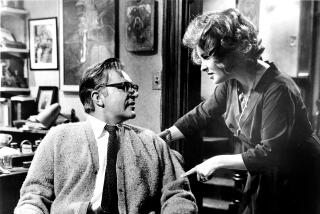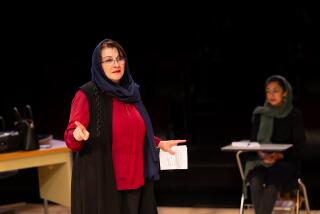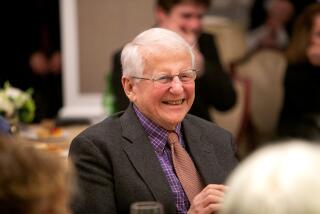Virginia Woolf, a Feminist Ahead of Her Time
For only the second time in its history, “Masterpiece Theatre” is airing a one-woman production, British actress Eileen Atkins playing Virginia Woolf in an adaptation of Woolf’s burnished call for women’s creative freedom, “A Room of One’s Own” (Sunday on KCET Channel 28 at 9 p.m.).
Woolf raised eyebrows in 1928 when she told young female students at Cambridge University’s Girton College that “a woman must have money and a room of one’s own if she is to write fiction.” She even had the sublime nerve, as a guest lecturer at the college, to exhort the young women to “earn 500 (English pounds) a year by your wits.”
As host Alistair Cooke chuckles, that sum translates into $50,000 today and it shocked the all-male bastion at Cambridge, where women, as we hear Woolf sardonically tell it, ate second-class food and were banned from the Cambridge Library.
Woolf’s lectures, which she published as the book “A Room of One’s Own,” constitute a major feminist statement decades before the feminist movement was ever dreamed of. And the spellbinding Atkins (following Maggie Smith as “Masterpiece Theatre’s” only solo actor) re-creates Woolf in the course of an hour’s brilliant chat in a warmly appointed room with unseen co-eds.
Unlike the real Woolf--who Cooke says read from more than 100 pages of notes in a tremulous voice--Atkins is an actress and, for those for whom the word lecture conveys pain, banish the chilly thought. There’s not a dull or static moment in the whole hour.
Atkins is brilliant and the camera work fluid in the realistic staging of adapter/director Patrick Garland. A major Woolf theme here is women with the genius to brush impediments out of their minds and achieve an “incandescence, like Shakespeare and Jane Austen did.” Here’s Woolf the lecturer stoking the fires in her young students to achieve what she calls “the man/womanly marriage of opposites” or “nuptials in the dark silence of our minds.”
“Anything written with a conscious (male or female sexual) bias is doomed to death,” Woolf declares. It might be in vogue for a moment, she adds, “but will wither by nightfall.”
Atkins/Woolf’s reconstruction of the “snubbed and slapped” lives of English-speaking women from Chaucer onward who were poets in their hearts but forbidden to write by a patriarchal society is daunting. But Woolf’s major dramatic dare is a tragic scenario of a creatively yearning but oppressed gender victim, Judith Shakespeare, the Bard’s younger sister.
The Judith motif informs the call for female independence as the early death of Shakespeare’s sister becomes Woolf’s symbol of the genius and struggle of later women who found a room of their own in which to write their fiction--as we course through the lives of the Brontes in the early 1800s, of Jane Austen, and of other British women writers, like George Sand, who took male pen names.
Atkins’ performance, originally staged live at London’s Playhouse, has been reported going to an Off-Broadway theater in February.
More to Read
The biggest entertainment stories
Get our big stories about Hollywood, film, television, music, arts, culture and more right in your inbox as soon as they publish.
You may occasionally receive promotional content from the Los Angeles Times.










